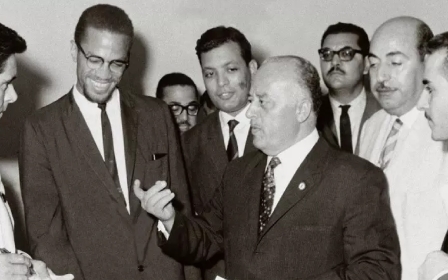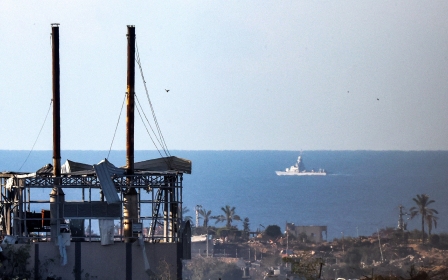Israeli PM Netanyahu's plans for post-war Gaza are 'vague and unrealistic'

A post-war plan for the governance of Gaza presented by Israel’s Prime Minister Benjamin Netanyahu is vague and unlikely to gain traction, according to analysts who spoke with Middle East Eye.
In a security cabinet meeting on Thursday, Netanyahu proposed that Israel would continue to maintain security control over the occupied West Bank and Gaza after the end of the ongoing war.
The prime minister said that Gaza would be demilitarised and deradicalised in the medium term, and proposed that Israel would have a presence along the Gaza-Egypt border, including at the Rafah crossing.
Regarding governance, he suggested replacing Hamas with local representatives "who are not affiliated with terrorist countries or groups, and are not financially supported by them".
Netanyahu also said that Unrwa, the United Nations agency for Palestinian refugees, should be disbanded and replaced with other international organisations.
New MEE newsletter: Jerusalem Dispatch
Sign up to get the latest insights and analysis on Israel-Palestine, alongside Turkey Unpacked and other MEE newsletters
The proposals, which were seen by Reuters, did not include timelines for the various Israeli aims.
"The plan does not offer any viable solution; on the contrary, it is a plan to reoccupy Gaza differently," Feras Abu Helal, columnist and editor of the Arab21 news site, told MEE.
Andreas Krieg, a senior lecturer at the School of Security Studies at King's College London, said he was "underwhelmed" by the plans.
"It's really not an evolution of these vague statements and visions that Netanyahu and his government have put out in recent months," he told MEE.
Krieg questioned the wording on the point of local leaders not affiliated with "terrorist groups" playing a role in administering the enclave.
"Does that mean anybody who's ever worked in the [current Gaza] administration and has received payments through the Hamas central administration is now a terrorist and cannot work in administration?" he said. "It doesn’t work."
'The plan does not offer any viable solution... it is a plan to reoccupy Gaza differently'
- Feras Abu Helal, columnist
Such an approach brings back memories of the United States’s military operation in Iraq in 2003, Krieg said, in which it completely rooted out Saddam Hussein’s ruling Baath party.
"The biggest and greatest single act of strategic failure in Iraq was the complete eradication of the old administration," Krieg said.
"Hamas, more than the Baath Party, has been deeply ingrained in the local fabric of administration, governance, pretty much anything that has to do with civil society [in Gaza]."
He said that as a result, under Netanyahu’s proposals, no Palestinian in Gaza would be left who could govern the territory.
The proposals made no mention of the Palestinian Authority (PA), which governs the occupied West Bank.
Netanyahu has in recent months said he would not allow the PA to rule Gaza, but did not rule it out during Thursday’s meeting.
'Docile population'
Laleh Khalili, an academic at the University of Exeter’s Institute of Arab and Islamic Studies, said the Israeli prime minister’s proposals have been part of Israeli thinking for some time.
"What Netanyahu wants is a wholly docile population, controlled by an even more docile security subcontractor than the Palestinian Authority has been," she told MEE.
"This has been a fantasy of revisionist Zionists going back to the grandfather of the Likud Party, the self-identified fascist, Zeev Jabotinsky, who believed that an 'iron wall of Jewish bayonets' would defeat Palestinians and force them into accepting a permanently subservient position."
Khalili said that there was no reason to suggest that such a reality would come to pass.
"The last century has shown the extent to which Palestinians have proven themselves resilient, resourceful, and insistent on their dignity, their humanity, and their right to self-determination."
Abu Helal said that Israel would not find Palestinian partners to play the role of a civilian authority.
"Israel tried a similar plan in the seventies of the last century in the West Bank by supporting the so-called 'Villages League (Rawabit al-Qura)'."
"Still, it eventually failed because Palestinians dealt with them as traitors," he said.
Buy-in of the Arab world
To put into action post-war plans for Gaza, Israel will also need to consult with regional players, including Egypt, Saudi Arabia, the UAE, and Qatar.
Abu Helal said that the proposals in their current form do not "take Egyptian's concerns into consideration".
Arab states will likely lead reconstruction of the ravaged territory once the war ends, alongside western countries and the UN.
'What Netanyahu wants is a wholly docile population, controlled by an even more docile security subcontractor than the PA has been'
- Laleh Khalili, academic
"At the bare minimum, [Israel] needs to have the buy-in of the Arab world," said Krieg.
"For that, it needs to have a clear roadmap to self-governance, which needs to include the Palestinian Authority one way or the other, but it also needs to include constituencies in Gaza that have affiliations with Hamas.
"There is no way you can just rely on Fatah to take over. That would not be accepted."
Krieg said that Arab neighbours will expect demilitarisation to include Israeli troops leaving Gaza, which is not alluded to in the post-war plans.
For Abu Helal, a post-war plan must include political and economic autonomy for Palestinians.
"Any viable plan for Gaza and the West Bank post-war should end the continuous siege on Gaza, give the right to Palestinians to have their own airport and seaport with European and Arab supervision," Abu Helal said.
"[It should] open the Rafah Crossing for aid and trade, give the Palestinians their right to choose who rules them, end the settlements in the West Bank, and reach a political solution that gives Palestinians their rights in their homeland."
This article is available in French on Middle East Eye French edition.
Middle East Eye delivers independent and unrivalled coverage and analysis of the Middle East, North Africa and beyond. To learn more about republishing this content and the associated fees, please fill out this form. More about MEE can be found here.





